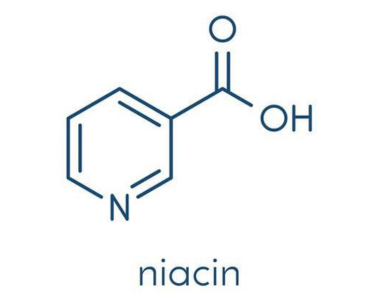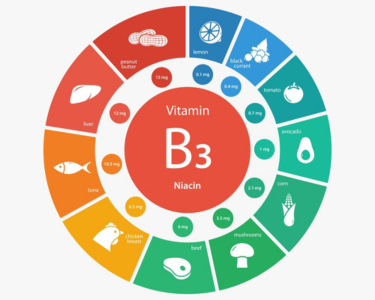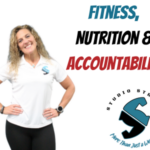Feel the Flush! The Power of Niacin

What is Niacin?
Niacin is a B vitamin that is also called vitamin B3. It is an important vitamin that helps keep your body working properly.

Why is Niacin Good for You?
Niacin provides many health benefits:
- It helps convert the food you eat into energy that your body can use.
- It keeps your skin, hair, eyes, and liver healthy.
- It helps your nervous system, brain, and nerves work right.
- It assists in making cholesterol and hormones that your body needs.
How Much Niacin Do You Need?
Most people need 14 to 18 mg per day.

Where Can We Find Niacin?
Niacin is in many foods. Here are some yummy sources:
- Meat: Chicken, turkey, and beef have niacin.
- Fish: Tuna and salmon are good choices.
- Whole Grains: Foods like brown rice and whole wheat bread.
- Nuts and Seeds: Peanuts are a great snack with niacin.
- Vegetables: Green veggies like peas and broccoli have some niacin too.
What Does Taking High Levels of Niacin Do?
Some people take 250-1000 mg of niacin supplements per day. This is much more than the recommended amount. Potential benefits include:
- Lowering “bad” LDL cholesterol and raising “good” HDL cholesterol.
- Reducing triglycerides, another type of fat in the blood.
- Improving circulation and blood flow.
However, high doses can also cause:
- Flushing – a warm, tingling red feeling in the face and body
- Stomach upset
- Liver damage
- Increased blood sugar
Slow stair step to increased dosage and flush
- Time released 250 mg is a safe place to start***
- At one month intervals, increase 250 mg
- Most max out at 1000 mg, some at 2000 mg. Please consult your healthcare provider to determine.
*** It’s important to only take high amounts of niacin under a doctor’s supervision due to these risks. ***
The Difference Between Flushing and Non-Flushing Niacin
Regular niacin causes flushing but lowers cholesterol well. Non-flushing niacin doesn’t cause flushing but may not lower cholesterol as effectively.
Niacin is an important vitamin that provides many health benefits. Make sure to get the recommended amount for your age from wholesome foods, and talk to your doctor before trying high dose niacin supplements.
References:
- U.S. National Library of Medicine. (2021). Niacin. MedlinePlus. https://medlineplus.gov/ency/article/002409.htm
- National Institutes of Health. (2021). Niacin: Fact Sheet for Consumers. Office of Dietary Supplements. https://ods.od.nih.gov/factsheets/Niacin-Consumer/





 Previous Post
Previous Post Next Post
Next Post